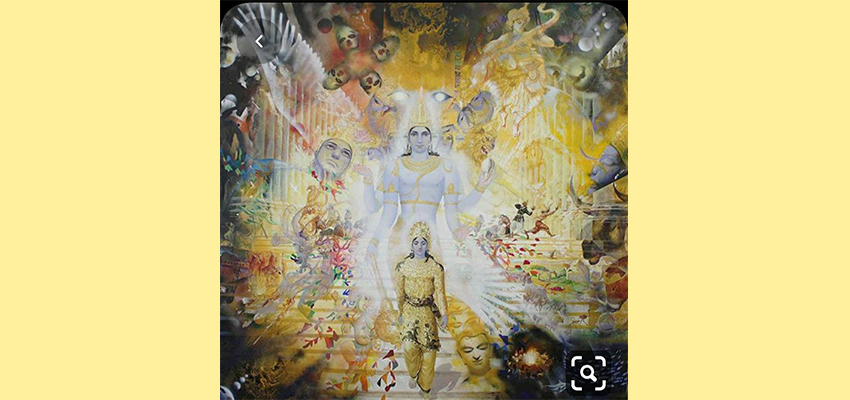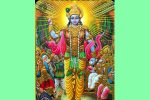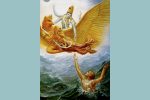NAME 15
Sākṣī साक्षी
What does the puruṣa do by remaining within? He not only rules, He also acts as a witness without partaking in any of the activities done by the embodied mind and body. Puruṣa seated within is the purest form of Consciousness and is not affected by any of the acts of the mind and body nor it induces the mind and body to act in a particular way. Kṛṣṇa also confirms this by saying, “ahaṁsākṣī” meaning I am the witness.
One’s actions unfold mainly due to one’s karma-s, vāsanā-s (unfulfilled desires in previous births) and saṁskāra-s (impressions of previous births in the subconscious mind). Brahman or puruṣa does not make a person to act. Hence Puruṣa is said to be a witness. But without He being present within, no action is possible. He is like subtle electricity burning a gross electrical lamp.
१५. ||ॐ साक्षीनै नमः ||
15. Om Sākṣīney Namah
Saakshee -Witness. In every day life he is a witness who without any mental reservation or personal interest observes and watches what is happening in a given field of experience. “SaakshaadDrashtariSaaksheesyaad-Amarakosa. “The ‘Knower’ in every bosom is the same Supreme Self”, says Lord Krishna (Geeta Ch. 13, St. 3). Though thus Consciousness illumines everything, It is only a Witness, as It knows no change. Just as the sun illumines every thing in the world and yet the Sun is not affected by the condition of the things it is illumining, so too Vishnu, the Supreme, illumines all, without Itself undergoing any change. According to Paanini Sutras the word Saakshee is derived from “Sa +akshi”, meaning “direct perceiver”.
INTERPRETATION GUIDED BY SANT VANI (WORDS OF SAINTS)
Sākṣhī
The witness (of everything).
Viṣhṇu is the sākṣhī, the witness of everything. Normally, we need the sense organs of perception, with the mind behind them, to see things. With respect to the mind, we gain the status of sākṣhī as we are able to see directly what happens. If I ask you, ‘What are you thinking about?” All of you will be able to tell me. How come? Because you can see your mind directly without the need of any sense organs.
On the other hand, Lord is sākṣātīkṣate, sees everything directly without the necessity, intervention of the sense organs or the mind. Hence His knowledge is free of the defects of the mind day the sense organs.
Further, He does not have to make an attempt to see. He sees all at once, the entire world of name and form as the consciousness which is His svarupa. That He is uninvolved in what He sees is implied here.
Practicing being in the witness state with non attachment is invoking this Sakshi Bhaav of Vishnu Tatva within.
A mirror reflects everything that appears before it, but unlike the camera it does not retain impressions when the object has moved away from it. A man of such consciousness will relate with people and things, but he will not enter into relationships involving attachment and aversion. He will mix in society, but his aloneness will remain inviolate and untouched. He will love, but his love will be like lines drawn on the surface of water. Even if he goes to fight, he will fight as though in a play which leaves no marks on the player after he is finished with it. His mirror of consciousness will reflect both love and war, but in itself it will remain unaffected by either. Whatever he will do, his consciousness will be still and steady like the center of the cyclone. His behavior will be just an acting. He will no more remain a doer; he will be an actor on the stage of life.
If Krishna is anything, he is an actor – a superb actor at that. There has never been a greater and more skilled actor in the whole history of man-kind. He is incomparable even as an actor – he who turned the whole world into a stage. While all other actors perform their skill on petty stages, Krishna uses the whole earth for his stage.
If a wooden stage can be used why not the whole earth? It does not make much difference; the world can be turned into a leela, a theatrical performance – which it really is – and we all can play our roles as actors and performers. An actor weeps and laughs, but tears and laughter don’t bind him; he remains untouched by them. When he loves he does not love, when he fights he does not fight; he is never involved in his roles as worldly people are. He plays a friend and a foe without being involved in friendship and enmity.
By turning inward one attains to non-attachment. And turning in is possible only if you become a witness – a watcher on the hill. Begin witnessing from any point of life and you will reach your innermost depth. And the moment you arrive at your center, you are non attached, you are like a lotus in water. The lotus is born in water, lives in water and yet remains untouched by it.
The state of witnessing is only possible through meditation: you reach the state of thoughtless awareness or one pointed thought. It’s combined together. Now the witness state is such a state where you just do not react. If you react, then the problem starts. It’s a very simple thing to understand that we react through our ego. A witness watches with DrashtaBhaav without involvement of entangling actions, thoughts and emotions. He does what is ought to be done in the present moment with love and compassion yet remains detached – The eternal Witness.
Meditation has two parts: the beginning and the end.
The beginning is called dhyana and the end is called samadhi. Dhyana is the seed, samadhi is the flowering. Dhyana means becoming aware of all workings of your mind, all the layers of your mind – your memories, your desires, your thoughts, dreams – becoming aware of all that goes on inside you. Dhyana is awareness, and samadhi is when the awareness has become so deep, so profound, so total that it is like a fire and it consumes the whole mind and all its functioning. It consumes thoughts, desires, ambitions, hopes, dreams. It consumes the whole stuff the mind is full of.
Samadhi is the state when awareness is there, but there is nothing to be aware inside you; the witness is there, but there is nothing to be witnessed.
Begin with dhyana, with meditation, and end in samadhi, in ecstasy, and you will know what God is. It is not a hypothesis, it is an experience. You have to LIVE it – that is the only way to know it.



